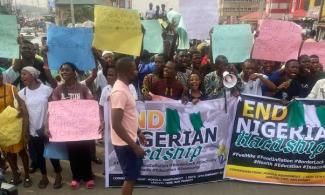
In a statement issued on Friday and sent to SaharaReporters, the group warned that Nigeria urgently needs to address the looming threat of nationwide violence.
The Nigerian Working Group on Peace Building and Conflict Prevention has cautioned President Bola Tinubu and other political leaders to be concerned about the current economic hardships faced by citizens, warning that the situation could have serious consequences if left unaddressed.
In a statement issued on Friday and sent to SaharaReporters, the group warned that Nigeria urgently needs to address the looming threat of nationwide violence.
The group also cautioned that the country's deepening economic and social crises are driving citizens to the brink, posing a significant risk to sustainable development and potentially disastrous consequences.
“While the Government tries to deal with the protests, it should also realise that the protests may reoccur again unless authorities meet their obligations to the people,” it said.
The statement was signed by the regional coordinators of the group, National Coordinator, Adewale Adeoye; Taiwo Adeleye (South-West); Werinipre Digifa (South-South), Abuka Onalo Omobaba (Middle-Belt), Kudu Abubakar (North West); and Fred Onijika (South East) and Lawan Idris (North East). The group was established in 2017, following a peace building and conflict resolution conferences held in the six geo-political political zones in Nigeria.
The Working Group said it had embarked on tours of the six geo-political zones to engage social and cultural formations, using its existing structures to stem the prospect of ethnic and religious violence which could spark due to the current tension across Nigeria.
The group said though Nigeria returned to democracy in 1999, corruption, mismanagement and favouritism which ensures cronies are appointed into critical positions without consideration for expertise and integrity, but driven by opportunism, combine to undermine the ability of the country to emerge from perpetual underdevelopment and threats of violence.
“Nigeria faces three major problems at the moment: the National Question which makes the definition of national interest absent; spineless corruption in Low and High places and the complete break-down of trust in public and private life of the citizenry’ the group said. The three underlined challenges are responsible for insecurity, violent ethnic clashes and armed rebellion in some parts of the country.”
The group said the situation is made worse by the fact that the process of emerging as elected leaders in Nigeria is marred by corruption and ineptitude which makes it difficult for credible leaders to emerge. ‘We are indeed at a crossroad of dreadful consequences unless the leaders do the right thing.’
With inflation at 34.2, essentials of life beyond the reach of the common man, food lacking on the table amidst threat to food security in rural and urban communities, the threat to democracy is not in doubt.
The Working Group urged Tinubu, state Governors and political leaders to understand and appreciate that Nigerians have been more than patient having endured for many years the betrayal of their elected leaders.
The Working Group called for the genuine and transparent dialogue with genuine intention to address the fears and expectations of Nigerians of all shades, including ethnic,religions, social and economic strata.
It urged Governments at all levels to stop the distribution of palliatives which in itself leads to scarcity of food items after government mass bulk purchases which also lead to inflation apart from the lack of social security numbers to ensure the palliatives do not go to the same people all the time.
“The funds being used for palliatives should be invested in agriculture. If the government had done this agro-investment eight months ago, by now the results would been food glut across the country. Palliatives only address the cosmetic needs of a few people without creating the pillars of jobs and real economic growth which the country urgently needs.’